Search titles
Displaying results 21 to 30 of 85.
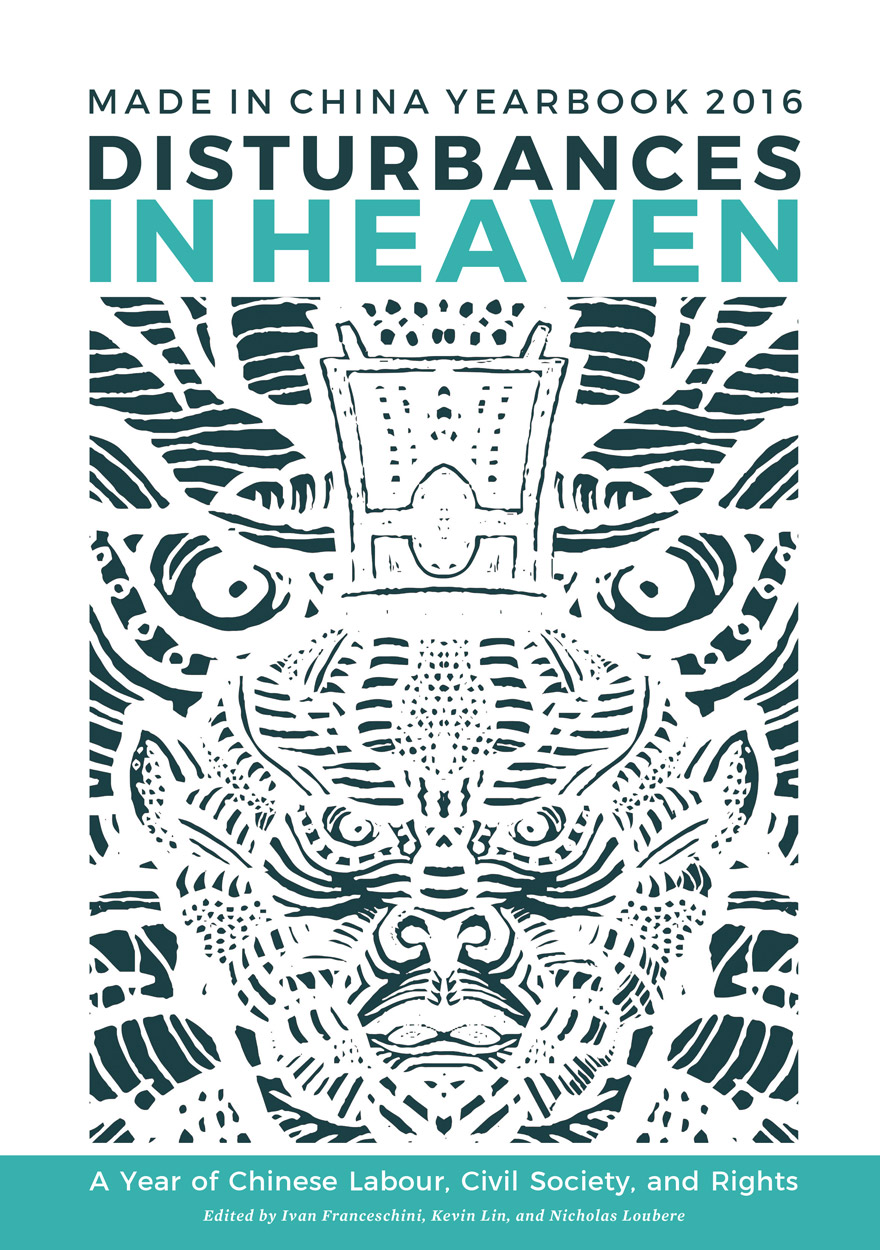
Disturbances in Heaven »
Made in China Yearbook 2016
Publication date: February 2017
Labour and civil society are two fundamental components of international discussions concerning China today. Whether it is the arrest of labour activists or rights lawyers, the adoption of new industrial policies, or the passing of draconian rules on non-governmental organisations, the events occurring in these areas in China often make global headlines. At the same time, in spite of the grave challenges for workers and activists, the Chinese labour movement is witnessing significant developments, with the occurrence of some of the largest strikes in decades. All of this calls for more serious analysis from both scholars and practitioners, as well for critical engagement with a broader global audience interested in forging international solidarity. It is with these aims in mind that we have compiled this Made in China Yearbook 2016: Disturbances in Heaven, a collection of original articles by both scholars and activists, analysing the most important trends in Chinese labour and civil society over the past year. With its unique blend of in-depth scholarly work written in a direct, accessible style, this volume will allow readers to situate events and policies related to Chinese labour and civil society in a wider context, and serve as an indispensable reference book for international activists, practitioners, and policy-makers.

Regulatory Theory »
Foundations and applications
Edited by: Peter Drahos
Publication date: February 2017
This volume introduces readers to regulatory theory. Aimed at practitioners, postgraduate students and those interested in regulation as a cross-cutting theme in the social sciences, Regulatory Theory includes chapters on the social-psychological foundations of regulation as well as theories of regulation such as responsive regulation, smart regulation and nodal governance. It explores the key themes of compliance, legal pluralism, meta-regulation, the rule of law, risk, accountability, globalisation and regulatory capitalism. The environment, crime, health, human rights, investment, migration and tax are among the fields of regulation considered in this ground-breaking book. Each chapter introduces the reader to key concepts and ideas and contains suggestions for further reading. The contributors, who either are or have been connected to the Regulatory Institutions Network (RegNet) at The Australian National University, include John Braithwaite, Valerie Braithwaite, Peter Grabosky, Neil Gunningham, Fiona Haines, Terry Halliday, David Levi-Faur, Christine Parker, Colin Scott and Clifford Shearing.
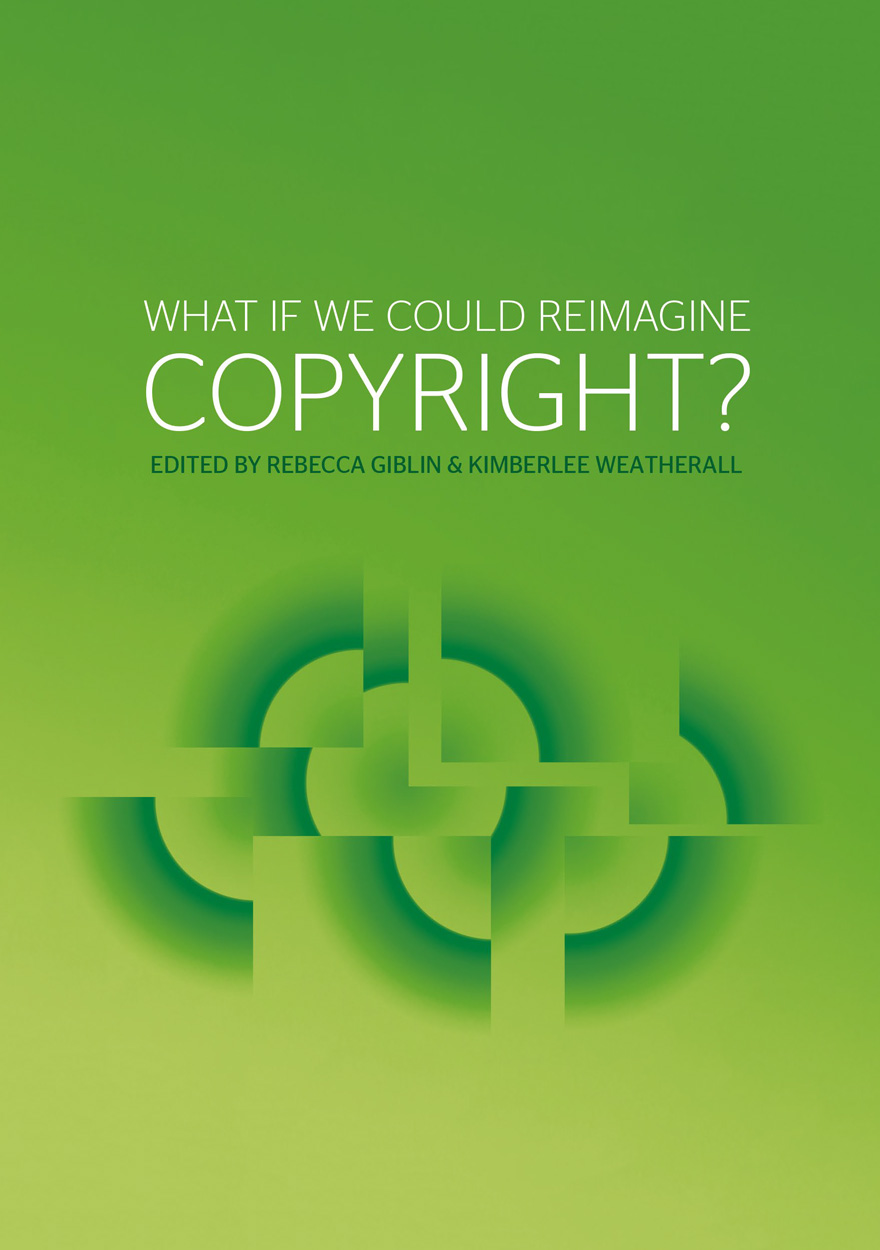
What if we could reimagine copyright? »
Edited by: Rebecca Giblin, Kimberlee Weatherall
Publication date: January 2017
What if we could start with a blank slate, and write ourselves a brand new copyright system? What if we could design a law, from scratch, unconstrained by existing treaty obligations, business models and questions of political feasibility? Would we opt for radical overhaul, or would we keep our current fundamentals? Which parts of the system would we jettison? Which would we keep? In short, what might a copyright system designed to further the public interest in the current legal and sociological environment actually look like?
Taking this thought experiment as their starting point, the leading international thinkers represented in this collection reconsider copyright’s fundamental questions: the subject matter that should be protected, the ideal scope and duration of those rights, and how it should be enforced. Tackling the biggest challenges affecting the current law, their essays provocatively explore how the law could better secure to creators the fruits of their labours, ensure better outcomes for the world’s more marginalised populations and solve orphan works. And while the result is a collection of impossible ideas, it also tells us much about what copyright could be – and what prescriptive treaty obligations currently force us to give up. The book shows that, reimagined, copyright could serve creators and the broader public far better than it currently does – and exposes intriguing new directions for achievable reform.
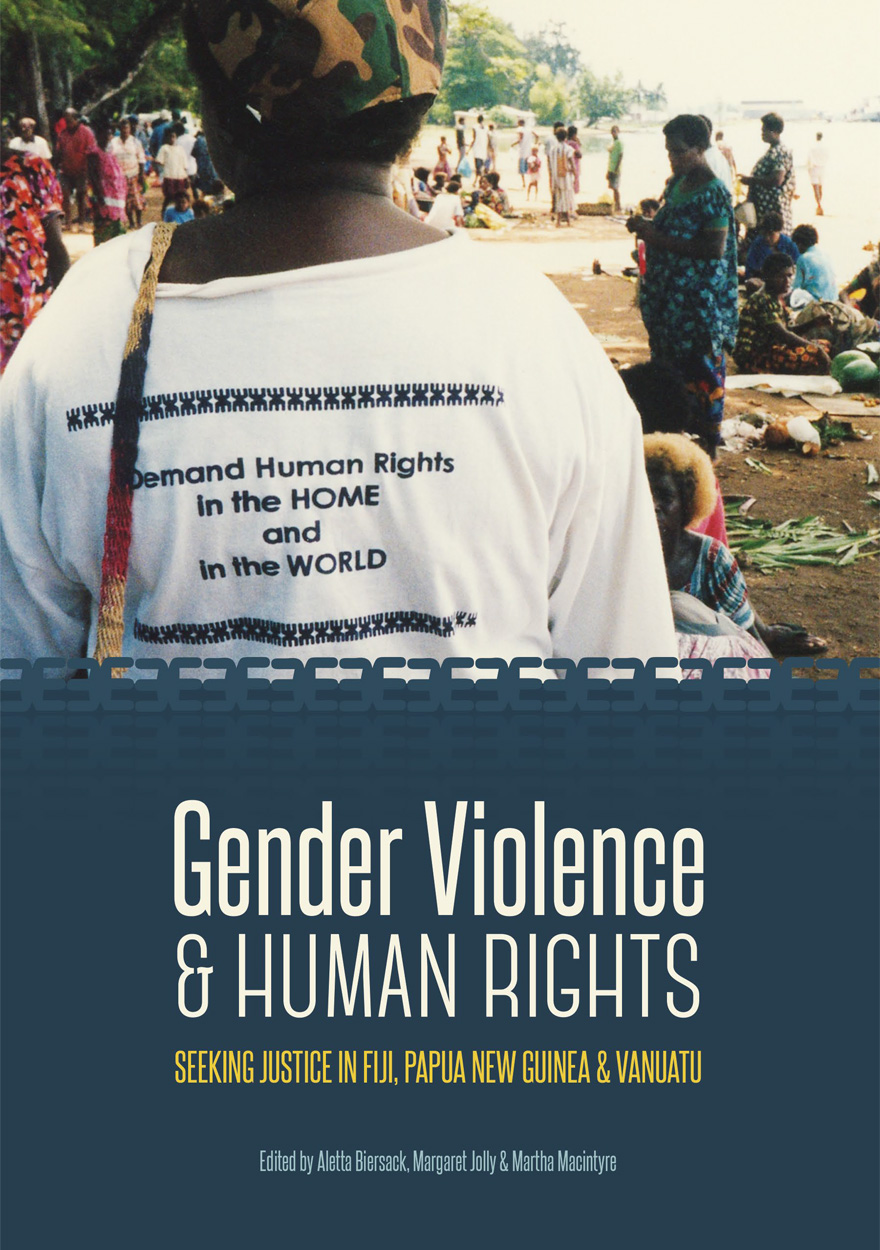
Gender Violence & Human Rights »
Seeking Justice in Fiji, Papua New Guinea and Vanuatu
Publication date: December 2016
The postcolonial states of Fiji, Papua New Guinea and Vanuatu operate today in a global arena in which human rights are widely accepted. As ratifiers of UN treaties such as the Convention on the Elimination of All Forms of Discrimination against Women and the Convention on the Rights of the Child, these Pacific Island countries have committed to promoting women’s and girls’ rights, including the right to a life free of violence. Yet local, national and regional gender values are not always consistent with the principles of gender equality and women’s rights that undergird these globalising conventions. This volume critically interrogates the relation between gender violence and human rights as these three countries and their communities and citizens engage with, appropriate, modify and at times resist human rights principles and their implications for gender violence. Grounded in extensive anthropological, historical and legal research, the volume should prove a crucial resource for the many scholars, policymakers and activists who are concerned about the urgent and ubiquitous problem of gender violence in the western Pacific.
‘This is an important and timely collection that is central to the major and contentious issues in the contemporary Pacific of gender violence and human rights. It builds upon existing literature … but the contributors to this volume interrogate the connection between these two areas deeply and more critically … This book should and must reach a broad audience.’
— Jacqui Leckie, Associate Professor, Anthropology and Archaeology, University of Otago
‘The volume addresses the tensions between human and cultural, individual and collective rights, as played out in the domain of gender … Gender is a perfect lens for exploring these tensions because cultural rights are often claimed in defence of gender oppression and because women often have imposed upon them the burden of representing cultural traditions in attire, comportment, restraint or putatively cultural conservatism. And Melanesia is a perfect place to consider these gendered issues because of the long history of ethnocentric representations of the region, because of the extent to which these are played out between states and local cultures and because of the efforts of the vibrant women’s movements in the region to develop locally workable responses to the problems of gender violence in these communities.’
— Christine Dureau, Senior Lecturer, Anthropology, University of Auckland

The Lion that Didn't Roar »
Can the Kimberley Process Stop the Blood Diamonds Trade?
Authored by: Nigel Davidson
Publication date: October 2016
In 2017 it will be Australia’s turn to chair the Kimberley Process Certification Scheme (KP), an international organisation set up to regulate the trade in diamonds. Diamonds are a symbol of love, purchased to celebrate marriage, and it is therefore deeply ironic that the diamond trade has become linked with warfare and human rights violations committed in African producer countries such as Sierra Leone, the Democratic Republic of Congo and, more recently, Zimbabwe and Angola. In their quest for diamonds, or by using diamonds to purchase weapons, armed groups in these countries have engaged in recruiting child soldiers, amputating limbs, and committing rape and murder. In response to the problem, the international community, non-governmental organisations and key industry players such as De Beers combined forces to create the Kimberley Process in 2002. The KP uses an export certificate system to distinguish the legitimate rough diamond trade from so-called ‘blood diamonds’, which are also known as ‘conflict diamonds’. This book considers the extent to which the KP, supported by other agencies at the international and national levels, has been effective in achieving its mandate. In so doing, it presents an original model derived from the domain of regulatory theory, the Dual Networked Pyramid, as a means of describing the operation of the system and suggesting possible improvements that might be made to it.
Nigel Davidson spoke with 936 ABC Hobart about what Australia can do to help stop blood diamonds. Listen to the full interview here.
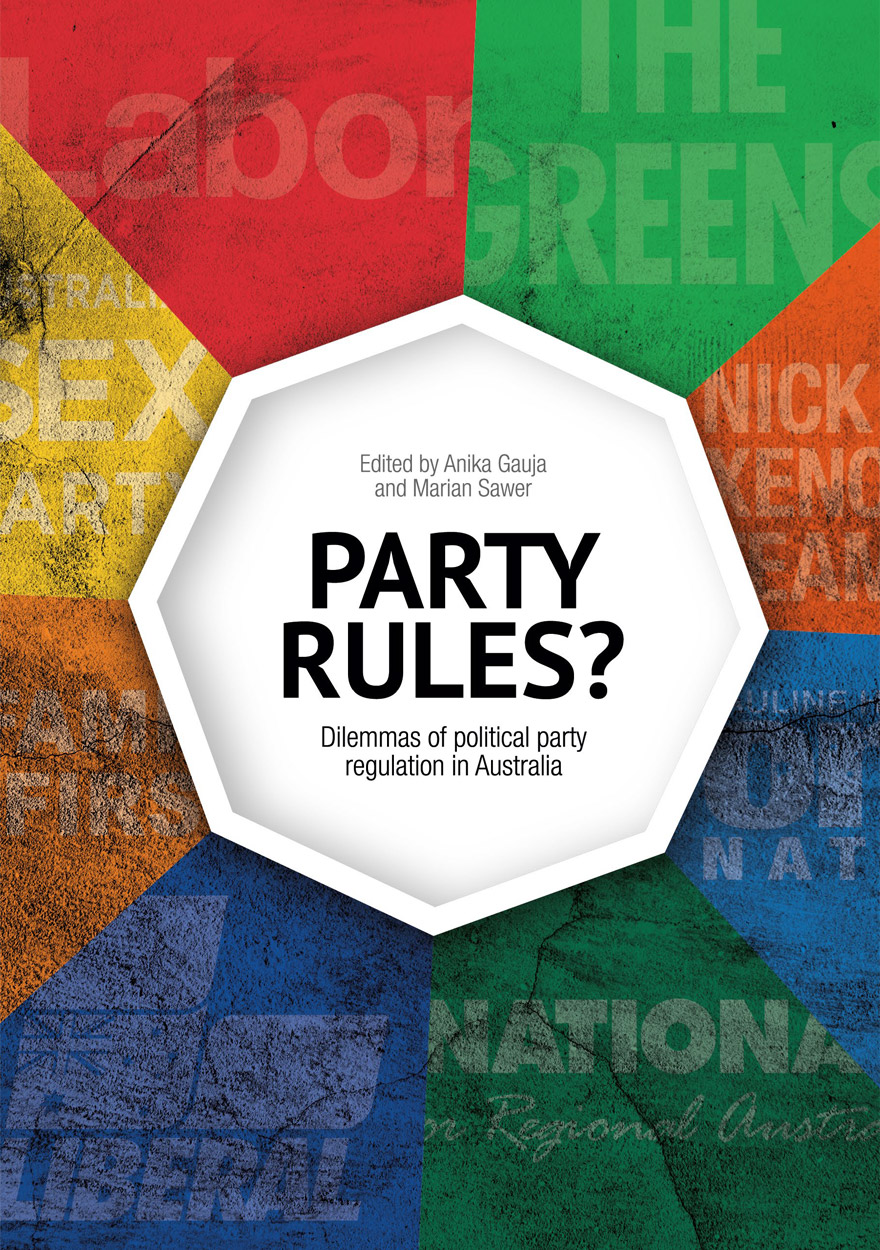
Party Rules? »
Dilemmas of political party regulation in Australia
Edited by: Anika Gauja, Marian Sawer
Publication date: October 2016
Trust in political parties has never been lower, but we have more and more of them, to the point where voters need magnifying sheets to read ballot papers. What is the relationship between party regulation and the nature of our democracy? How is it that parties have been able to gather so many public resources yet with so little scrutiny of their affairs? This is the first book on party regulation in Australia. It covers a wide range of issues, from party donations to candidate selection, from expectations of parties in a representative democracy to the reluctance to regulate and the role of the courts where legislators fear to tread.
‘The regulation of political parties is one of the most important, but unexplored areas of Australian electoral policy. This important book fills that gap in providing a stimulating and insightful analysis of the pitfalls and potential solutions in this area.’
— Professor George Williams AO

East Asia Forum Quarterly: Volume 8, Number 3, 2016 »
Publication date: September 2016
East Asia Forum Quarterly grew out of East Asia Forum (EAF) online, which has developed a reputation for providing a platform for the best in Asian analysis, research and policy comment on the Asia Pacific region in world affairs. EAFQ aims to provide a further window onto research in the leading research institutes in Asia and to provide expert comment on current developments within the region. The East Asia Forum Quarterly, like East Asia Forum online, is an initiative of the East Asia Forum (EAF) and its host organisation, the East Asian Bureau of Economic Research (EABER) in the Crawford School of Economics and Government in the College of Asia & the Pacific at The Australian National University.
Download for free
Not available for purchase

Unintended Consequences »
The impact of migration law and policy
Publication date: August 2016
This book arose from an inaugural conference on Migration Law and Policy at the ANU College of Law. The conference brought together academics and practitioners from a diverse range of disciplines and practice. The book is based on a selection of the papers and presentations given during that conference. Each explores the unexpected, unwanted and sometimes tragic outcomes of migration law and policy, identifying ambiguities, uncertainties, and omissions affecting both temporary and permanent migrants. Together, the papers present a myriad of perspectives, providing a sense of urgency that focuses on the immediate and political consequences of an Australian migration milieu created without due consideration and exposing the daily reality under the migration program for individuals and for society as a whole.

Partnership for Change »
Australia–China Joint Economic Report
Authored by: East Asian Bureau of Economic Research, China Center for International Economic Exchanges
Publication date: August 2016
The Australia–China Joint Economic Report is the first major independent joint study of the bilateral relationship and has the blessing of both national governments. The Report is an academic policy study by leading researchers in both Australia and China. It draws policy conclusions to guide the development of bilateral economic relations that include an Australia–China Comprehensive Strategic Partnership for Change, an Australia–China Commission, and an Australia–China Basic Treaty of Cooperation.
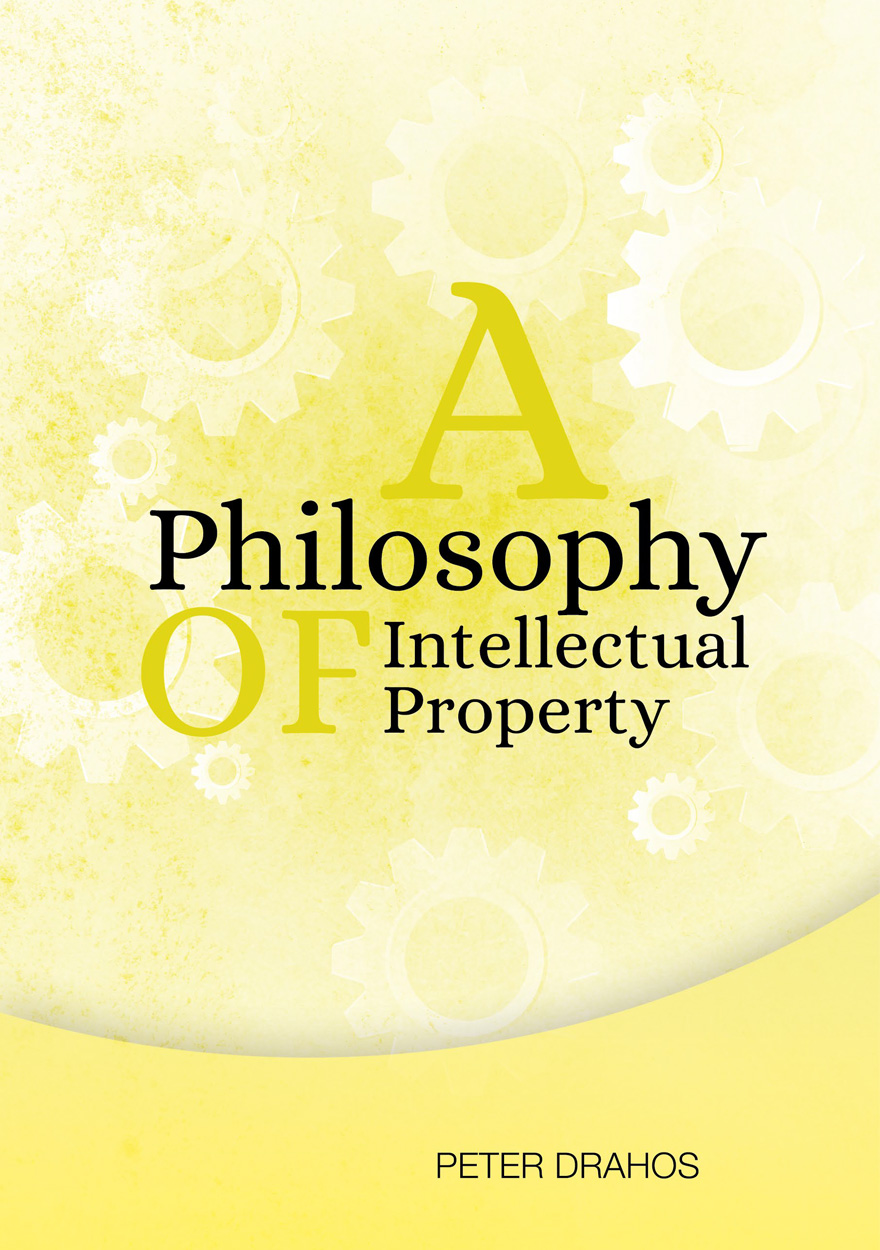
A Philosophy of Intellectual Property »
Authored by: Peter Drahos
Publication date: June 2016
Are intellectual property rights like other property rights? More and more of the world’s knowledge and information is under the control of intellectual property owners. What are the justifications for this? What are the implications for power and for justice of allowing this property form to range across social life? Can we look to traditional property theory to supply the answers or do we need a new approach? Intellectual property rights relate to abstract objects – objects like algorithms and DNA sequences. The consequences of creating property rights in such objects are far-reaching. A Philosophy of Intellectual Property argues that lying at the heart of intellectual property are duty-bearing privileges. We should adopt an instrumentalist approach to intellectual property and reject a proprietarian approach – an approach which emphasises the connection between labour and property rights. The analysis draws on the history of intellectual property, legal materials, the work of Grotius, Pufendorf, Locke, Marx and Hegel, as well as economic, sociological and legal theory. The book is designed to be accessible to specialists in a number of fields as well as students. It will interest philosophers, political scientists, economists, and legal scholars, as well as those professionals concerned with policy issues raised by modern technologies and the information society.
Download for free
Not available for purchase



